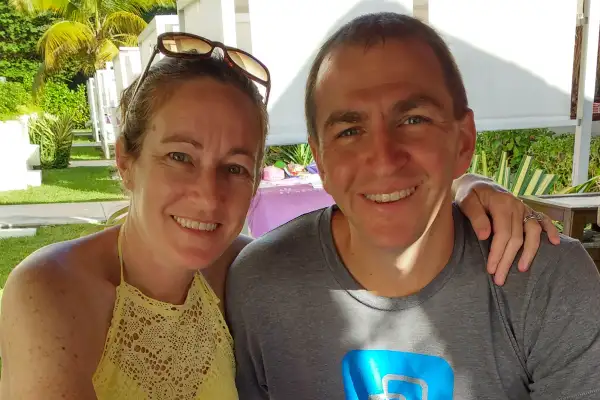How This Couple Saved $1 Million in 11 Years and Became Financially Independent Before 40

Convenience drives American cuisine, and from her kitchen in Richmond, Va., Laura Barrett has put her own, more economical spin on the concept.
Every couple of months, the stay-at-home mom spends two to three hours breading and frying chicken cutlets. It’s an upfront effort, yes, but one that makes life more convenient later on, as the family has a ready source of protein to build quick meals around for weeks to come.
It’s also loads cheaper than buying takeout regularly. Barrett buys the family pack of chicken at her local Wegmans, which is $1.79 per pound.
“You have to buy 6 pounds of chicken breast to get that deal,” says Barrett, 39. The family has an extra chest freezer in their garage, and Barrett freezes the excess in three-quarter-pound packages that she then uses in salads, sandwiches, or serving plain with rice.
That money-saving move is one of many employed by Barrett and her husband, Brad, 38, who through their thrifty ways saved $1 million in just 11 years and achieved financial independence before age 40. Brad retired from his full-time accountant job three years ago, at age 35, to focus on his financial independence website and podcast, ChooseFi. Laura, also an accountant, stopped full-time work when her first daughter was born but prepares tax returns from home during tax season, mostly to keep her skills sharp and because she enjoys it. The income from Brad's web site and Laura's seasonal work is enough to cover their living expenses, so they are currently not drawing down their savings.
The couple's two daughters are ages nine and six. The family is planning a 24-day trip to Europe this summer, largely funded through their credit card reward points. Brad and Laura are part of the burgeoning FIRE movement — short for financial independence, retire early — whose members save aggressively so they can quit their traditional jobs decades ahead of schedule and focus on activities that give their lives more meaning. Here’s how they achieved a life of financial freedom.
Cook in Bulk
Laura works off a rough metric that dinner should cost no more than $2 per person, so $8 total for the family of four. It’s possible to eat well within these limits, but it takes some planning.
She maps out meals before going to the store and buys ingredients, like the chicken breast, in bulk. She cooks in bulk, too, often tripling a recipe and freezing the leftovers. “I love to cook, but I don’t like to do it every day,” she says.
One meal that her family loves — chicken in a paprika-flavored tomato broth over egg noodles — works out to $1.25 per meal, according to her calculations.
The family never eats out as a foursome. When grandparents come to visit, maybe once every six weeks or so, Laura and Brad take advantage of the free babysitting to go to a restaurant alone. They also like to entertain friends at their four-bedroom colonial. “Everyone brings something and you’re good to go,” Brad says.
Get Covered
Medicare doesn’t start for most people until the traditional retirement age of 65. In a country where health coverage is tethered to work, this makes health insurance a big consideration for those who want to leave the workforce early.
The Barretts get coverage through Liberty Health Share. It is one of several so-called cost-sharing ministries, whose members share Christian beliefs and agree to help pay one another’s medical bills. While it is not health insurance, it functions similarly. The family has a membership card that they present to their doctors, who then submit bills to Liberty for reimbursement.
The family pays $449 a month for a plan that has a $1,500 annual deductible. There are certain exclusions: generally, pre-existing conditions aren’t covered at all in the beginning, then subject to a $50,000 limit for three years of continuous membership, after which coverage is allowed. Certain prescription drugs are also not covered.
“This isn’t for everyone,” Brad says. But his family is generally healthy, and the plan has worked well for them, including paying for a daughter’s tonsillectomy.
Don’t Upgrade Your Ride
Most of the Barrett’s friends drive new cars: a minivan for the kids, then some kind of fancy sedan. The Barretts have two cars but the Honda and Toyota are both 2003 models that the couple has no plans to upgrade any time soon.
Not only does driving old wheels save on the obvious car payments, but it also trims their insurance costs and their bill for Virginia’s vehicle tax. Their bill for the latter was $140 for the two cars, much less than the roughly $1,000 that their friends paid for new cars.
The couple slashes their wireless bill with equal verve: each pays between $12 and $16 for a plan from Republic Wireless. A comparable plan now is $20 for unlimited talk and text plus one gigabyte of monthly data. Brad says he uses about a tenth of that amount.
Their thrifty lifestyle isn’t about deprivation, Brad says. It’s about the freedom to pursue your passions. For him, that's entrepreneurship: his ChooseFi web site has inspired local groups in 20 countries, including South Africa, Russia and Japan. His message to everyone keeping up with the Joneses? “Think a little bit differently.”
